Russia tightens grip on Crimea; U.S. threatens sanctions over Ukraine crisis
March 3, 2014 -- Updated 2016 GMT (0416 HKT)
STORY HIGHLIGHTS
- NEW: Obama: U.S. weighing diplomatic and economic steps to "isolate Russia"
- Russian moves are a "clear violation of Ukrainian sovereignty," EU council says
- Russian foreign minister tells critics to put aside "geopolitical calculations"
- Former Ukraine PM asks "all the world" for help in stopping Ukraine from losing Crimea
(CNN) -- Tensions smoldered in Ukraine, and in capitals around the world on Monday, as Russian troops consolidated their hold on the Ukrainian peninsula of Crimea, global stocks slipped on fears things could get worse and diplomats grasped for a way to stop the crisis from escalating.
British Foreign Secretary William Hague called the situation Europe's most serious crisis of the still-young 21st century. An emergency U.N. Security Council meeting was scheduled for later in the day.
U.S. President Barack Obama said the United States is examining a series of economic and diplomatic steps to "isolate Russia," and he called on Congress to work with his administration on an economic assistance package for Ukraine.
In Crimea, more Russian troops arrived, surrounding military posts and other facilities and taking effective control of the peninsula from Ukrainian authorities. What they planned to do next remained unclear. In one ominous incident, a Ukrainian Defense Ministry spokesman said the commander of Russia's Black Sea fleet boarded a blocked Ukrainian warship and issued a threat.
"Swear allegiance to the new Crimean authorities, or surrender, or face an attack," he said, according to the spokesman, Vladislav Seleznev.
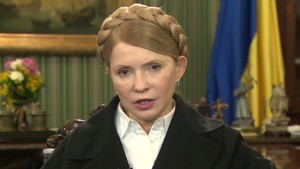
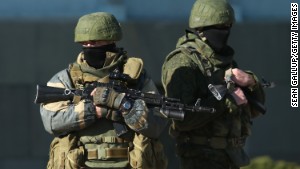
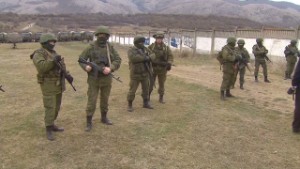
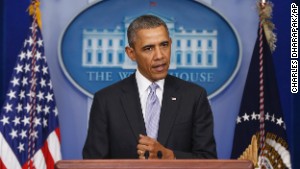
But a spokesman for the Russian Black Sea Fleet said there are no plans to storm Ukrainian military units in Crimea, according to the state-run Interfax news agency.
Despite the assurance, stocks fell around the world, with Russian stocks leading the way as investors parsed the day's developments. Markets declined in Asia, Europe and the United States, where the benchmark Dow Jones was down more than 200 points in mid-afternoon trading.
Although Russia's foreign minister rejected claims his country was acting aggressively, his European Union counterparts met in Brussels to condemn what they called Russia's "clear violation of Ukrainian sovereignty and territorial integrity." They demanded Moscow pull its troops back or face possible sanctions.
Vice President Joe Biden, speaking by telephone to Russian Prime Minister Dmitry Medvedev, warned of increasing political and economic isolation.
State Department spokeswoman Jen Psaki said Monday that sanctions against Russia weren't just possible, but likely.
A senior U.S. administration official told CNN that Russian forces "have complete operational control of the Crimean Peninsula." The official said the U.S. estimates there are 6,000 Russian ground and naval forces in the region.
"There is no question that they are in an occupation position -- flying in reinforcements and settling in," another senior administration official said.
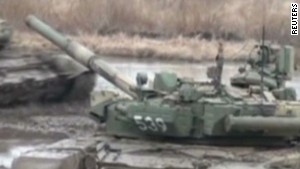
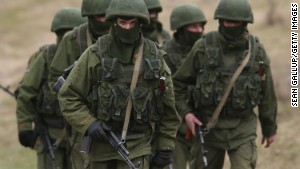
In Kiev, interim Prime Minister Arseniy Yatsenyuk, who has accused Moscow of declaring war, vowed that his West-leaning government would not give up the region.
"Nobody will give Crimea away. ... There are no grounds for the use of force against civilians and Ukrainians, and for the entry of the Russian military contingent," he said. "Russia never had any grounds and never will."
Ukraine's shaky new government has mobilized troops and called up military reservists.
Former Ukrainian Prime Minister Yulia Tymoshenko, released from jail last week, asked the international community for help.
"I am asking all the world, personally every world leader, to use all the possibilities in order to avoid Ukraine losing Crimea," she told CNN's Christiane Amanpour in an interview.

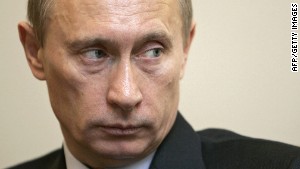
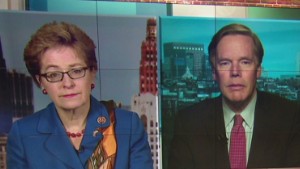
Camouflaged and unidentified
Ukrainian border guards on Monday reported a buildup of armored vehicles on the Russian side of a narrow sea channel dividing Russia and Crimea, Reuters reported, citing a border guard spokesman.
He said that Russian ships had been moving in and around the city of Sevastopol, where the Russian Black Sea Fleet has a base, and Russian forces had blocked mobile telephone service in some areas. The buildup of Russian armor was near a ferry port on the Russian side of the Kerch Channel, opposite the Ukrainian city of Kerch.
Meanwhile, the Ukrainian State Border Security Service said there had been several attacks on border posts in eastern Crimea just along the border with Russia.
Also on Sunday night, unidentified armed men tried to enter the arms depot in Belbek military base near Sevastopol, said Seleznev, the Ukrainian Defense Ministry spokesman. Ukrainian forces shot into the air to warn them off, but the unidentified men used sound grenades and a Ukrainian commander was wounded as a result, Seleznev told CNN.
The attackers gained access to the base, but Ukrainian troops retain control of the weapons depot and administration building, Seleznev added.
Men dressed in both civilian and camouflage gear with red armbands have patrolled the streets of the regional capital, Simferopol. The area has seen several pro-Russia demonstrations with crowds waving Russian flags and shouting "Thank you, Putin."
Navy defector seeks allies
Ten Ukrainian military and naval bases in Crimea were blocked Monday by armed men, the newly appointed naval commander of Ukraine, Rear Admiral Serhei Gayduk, told a Ukrainian TV station.
His predecessor, Denis Berezovsky, who on Sunday said he would not submit to orders from Kiev and defected, was said to have entered the Ukrainian naval base in Crimea under the protection of a group of Cossacks and tried to convince other Ukrainian officers to defect. However, Gayduk was at the base and urged officers to maintain their allegiance to Ukraine, the Defense Ministry's Seleznev told CNN. Troops responded by singing the Ukrainian national anthem.
These scenes come after Putin secured permission from his parliament Saturday to use military force to protect Russian citizens in Ukraine and told U.S. President Barack Obama he had the right to defend Russian interests and nationals, spurning Western pleas not to intervene.
Worried West
The tensions have worried the West, and Russia's G8 partners have condemned Moscow's military buildup in Crimea. The world's seven major industrialized powers also suspended preparations for the G8 summit in Sochi, Russia, in June.
Their finance ministers announced some economic support for cash-strapped Ukraine.
"We are also committed to mobilize rapid technical assistance to support Ukraine in addressing its macroeconomic, regulatory, and anti-corruption challenges," the finance ministers said in a written statement.
U.S. Secretary of State John Kerry, due in Kiev Tuesday, said several foreign powers are looking at economic consequences if Russia does not withdraw its forces.
Obama said Monday that Russia's military moves in Crimea violated international law, adding that "no country has a right to send in troops to another country unprovoked."
Obama said Russia should consider international condemnation of its military moves in Ukraine, adding that "over time, this will be a costly proposition" due to sanctions and isolation that will result if the situation continues or worsens.
Kerry will offer Ukraine a "specific" package of U.S. economic aid when he travels to Kiev for talks Tuesday, Obama said.
"It is now of the utmost importance to install calm and de-escalate tensions immediately through dialogue," U.N. Secretary-General Ban Ki-moon told reporters.
Scheduled to meet Lavrov later Monday, he urged "that the Russian Federation refrain from any acts and rhetoric that can further escalate the situation and instead engage constructively and through peaceful means with Ukraine."
German Chancellor Angela Merkel's office said Putin had accepted a proposal to establish a "fact-finding mission" to Ukraine, possibly under the leadership of the Organization for Security and Co-operation in Europe, and to start a political dialogue.
Moscow has defended its parliament's approval of President Vladimir Putin's use of military force to protect its citizens in the Crimean Peninsula, an autonomous region of eastern Ukraine with strong loyalty to Russia.
"I repeat: This is a matter of defending our citizens and our compatriots, of defending the most important human right -- the right to life," Russian Foreign Minister Sergey Lavrov said at a U.N. human rights meeting in Geneva, Switzerland.
But Ukraine's ambassador to the U.N. says Russia's reasoning for a possible invasion is fake.
"There is no evidence that the Russian ethnic population or Russian-speaking population is under threat," Ambassador Yuri Sergeyev told CNN.
The Russian parliament, or Duma, is also considering a law that would allow for the annexation of Crimea, according to the parliament's website.
"Now they are trying to create new legal basis to prove annexation of the territory they're now occupying," Sergeyev said.
East vs. West
Ukraine, a nation of 45 million people sandwiched between Europe and Russia's southwestern border, has been in chaos since Yanukovych was ousted on February 22 after bloody street protests that left dozens dead and hundreds wounded.
Anti-government demonstrations started in late November, when Yanukovych spurned a deal with the EU, favoring closer ties with Moscow instead.
Ukraine has faced a deepening split, with those in the west generally supporting the interim government and its European Union tilt, while many in the east prefer a Ukraine where Russia casts a long shadow.
Nowhere is that feeling more intense than in Crimea, the last big bastion of opposition to the new political leadership. Ukraine suspects Russia of fomenting tension in the autonomous region that might escalate into a bid for separation by its Russian majority.
Ukrainian leaders and commentators have compared events in Crimea to what happened in Georgia in 2008. Then, cross-border tensions with Russia exploded into a five-day conflict that saw Russian tanks and troops pour into the breakaway territories of South Ossetia and Abkhazia, as well as Georgian cities. Russia and Georgia each blamed the other for starting the conflict.
CNN's Diana Magnay in Simferopol, Alla Eshchenko in Moscow, Lindsay Isaac and Rob North in London, Neda Farshbaf in Atlanta, Tom Cohen in Washington, Dominique Van Heerden and journalist Azad Safarov in Kiev contributed to this report.
We recommend
From around the web
Return To The Cold War? Not A Chance(Letters From Us)
Obamacare public perception turning(iHealth Care Updates)
Here are five reasons the world's largest economies are watching what happens in Ukraine.
March 3, 2014 -- Updated 0105 GMT (0905 HKT)
If a full-fledged war erupts, Ukraine's military would be dwarfed by Russia's troops. What's more, Russia's defense budget is far higher.
March 3, 2014 -- Updated 1326 GMT (2126 HKT)
As of Sunday, Russian forces had "complete operational control of the Crimean Peninsula, and Ukraine mobilized troops in this rapidly escalating crisis.
March 1, 2014 -- Updated 1516 GMT (2316 HKT)
Russia's upper house of parliament approves the use of military force in Ukraine. CNN's Fred Pleitgen reports.
March 1, 2014 -- Updated 0212 GMT (1012 HKT)
CNN's Tom Foreman breaks down why Ukraine is important both politically and geographically.
March 1, 2014 -- Updated 2111 GMT (0511 HKT)
It's a conflict culled from the pages of the Cold War. With Ukraine possibly teetering on the brink of war, here are three things you need to know.
February 28, 2014 -- Updated 1250 GMT (2050 HKT)
The situation is serious and the risks are enormous. Crimea is the flashpoint. If Ukraine unravels, it will begin there, says Frida Ghitis.
February 23, 2014 -- Updated 2121 GMT (0521 HKT)
Julia Ioffe, senior editor of The New Republic, offers her insight into the future for Ukraine.
The current crisis is largely fueled by Ukraine's mixed loyalties and linguistic divisions. See where the country is split.
February 25, 2014 -- Updated 1330 GMT (2130 HKT)
Timothy Snyder says we're witnessing something extraordinary in Ukraine and the West has to provide support for the future of democracy.
February 24, 2014 -- Updated 1654 GMT (0054 HKT)
Ukrainians got their first glimpse of the grounds of President Viktor Yanukovich's residence outside Kiev.
Ukrainian Ambassador to the U.N. Yuriy Sergeyev criticized the man who just days ago was President of his country, Viktor Yanukovych.
February 23, 2014 -- Updated 1808 GMT (0208 HKT)
Analysis: Are the U.S. and Russia playing chess, or is it a blood sport?
February 20, 2014 -- Updated 2126 GMT (0526 HKT)
For three months protests have shaken Ukraine -- CNN has the background story.
February 20, 2014 -- Updated 2112 GMT (0512 HKT)
See how Independence Square has been so devastated.
February 20, 2014 -- Updated 1119 GMT (1919 HKT)
CNN's Miguel Marquez reports on a young Kiev woman's compelling plea for freedom that has gone viral.
February 20, 2014 -- Updated 1030 GMT (1830 HKT)
A drone offers a unique perspective of the protests in Independence Square in Kiev, Ukraine.
Have you witnessed the protests in Ukraine? Send us your images and video, but please stay safe.
Most Popular
Today's five most popular stories
43°
HI 48°LO 37°
London, United KingdomWeather forecast
Home | Video | World | U.S. | Africa | Asia | Europe | Latin America | Middle East | Business | World Sport | Entertainment | Tech | Travel | iReport
Tools & Widgets | RSS | Podcasts | Blogs | CNN Mobile | My Profile | E-mail Alerts | CNN Shop | Site map | CNN Partner Hotels

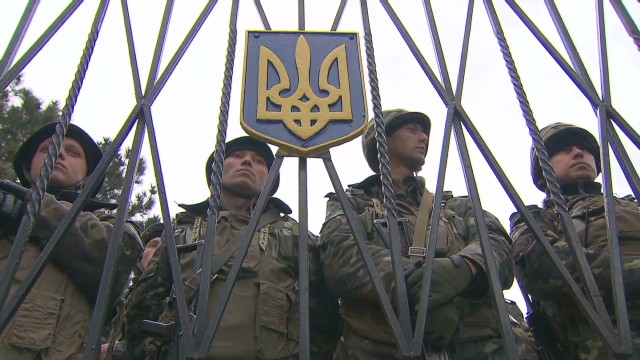




































No comments:
Post a Comment